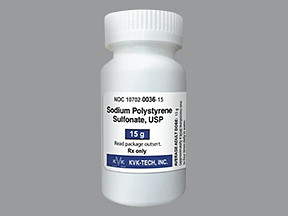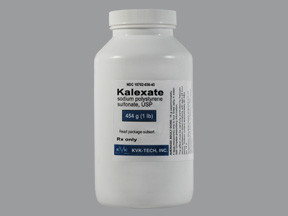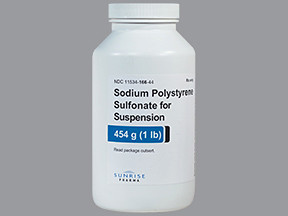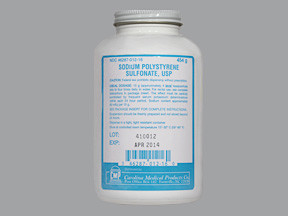SODIUM POLYSTYRENE SULFONATE POWDER FOR SUSPENSION - ORAL, RECTAL
PHONETIC PRONUNCIATION: (SOE-dee-um POL-ee-STYE-reen SUL-foe-nate)
COMMON BRAND NAME(S): Kayexalate, Kionex, Marlexate
GENERIC NAME(S): sodium polystyrene sulfonate
Uses
USES: This medication is used to treat a high level of potassium in your blood. Too much potassium in your blood can sometimes cause heart rhythm problems. Sodium polystyrene sulfonate works by helping your body get rid of extra potassium.
How to use SODIUM POLYSTYRENE SULFONATE POWDER FOR SUSPENSION - ORAL, RECTAL
HOW TO USE: Take this medication by mouth, or use it rectally as directed by your doctor. If you are taking this medication by mouth, take it usually 1 to 4 times a day as directed by your doctor. To prepare the liquid suspension, carefully measure the prescribed dose of the powder and mix it with the prescribed amount of water or flavored syrup as directed. Stir well and drink the entire dose. Stay upright (sitting, standing, or walking) and do not lie down for at least an hour after your dose. Consult your doctor for details. Sodium polystyrene sulfonate may decrease your absorption of other medications. Take your other medications as directed by your doctor, usually at least 3 hours before or 3 hours after sodium polystyrene sulfonate. Ask your doctor or pharmacist for more information or if you have any questions. To give this medication rectally as an enema, use the prescribed dose usually every 6 hours as needed or as directed by your doctor. Consult your doctor or pharmacist for directions on how to prepare and mix the dose into a suspension and how to use the enema. Follow instructions for the use of a cleansing enema both before and after your dose of sodium polystyrene sulfonate. The cleansing enema after each rectal dose of this medication should be a non-sodium-containing enema. Stir the suspension well, and use it soon after mixing. Do not store the mixture for more than 24 hours. Do not heat this medication because it may not work as well. The dosage and length of treatment are based on your medical condition and response to treatment. Follow your doctor's instructions carefully. Do not use more of this medication or use it for longer than directed because your potassium blood level may drop too low. Keep all laboratory and medical appointments so your doctor can check your potassium blood level.
Side Effects
Precautions
Interactions
Overdose
Images
Reviews
Faq for SODIUM POLYSTYRENE SULFONATE POWDER FOR SUSPENSION - ORAL, RECTAL
Sodium polystyrene sulfonate powder for suspension is used to treat high levels of potassium in the blood, a condition known as hyperkalemia.
This medication works by binding to the excess potassium in the digestive system and removing it from the body through bowel movements.
The powder should be mixed with water or another liquid and taken by mouth or through a rectal enema. It is important to follow the instructions provided by your healthcare provider.
Some common side effects may include upset stomach, nausea, vomiting, or constipation. It is important to notify your doctor if you experience any severe or persistent side effects.
It is important to inform your doctor about all the medications you are currently taking, including over-the-counter drugs and herbal supplements. Some medications may interact with sodium polystyrene sulfonate, so your doctor can advise you on the best course of action.
The onset of action may vary depending on the individual and the severity of the hyperkalemia. It is best to follow your doctor's instructions and monitor your potassium levels regularly.
It is important to consult with your healthcare provider if you are pregnant or breastfeeding before taking this medication. They can assess the potential risks and benefits and provide guidance.
If you miss a dose, take it as soon as you remember. However, if it is close to the time for your next dose, skip the missed dose and continue with your regular dosing schedule. Do not double the dose.
It is recommended to maintain a balanced diet and follow any specific dietary instructions given by your healthcare provider. Some foods high in potassium may need to be limited or avoided.
Disclaimer
IMPORTANT: HOW TO USE THIS INFORMATION: This is a summary and does NOT have all possible information about this product. This information does not assure that this product is safe, effective, or appropriate for you. This information is not individual medical advice and does not substitute for the advice of your health care professional. Always ask your health care professional for complete information about this product and your specific health needs.





No Reviews Yet